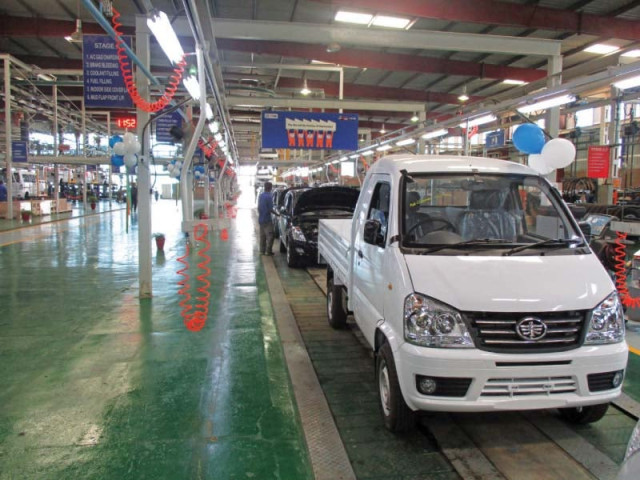Can Chinese cars compete with established auto giants of Pakistan?
Car assembly in country highlights FAW Motors’ long-term commitment

After almost a decade, Korean giants like Hyundai Motor Company and Kia Motors Corporation are re-entering in collaboration with big business groups in Pakistan. PHOTO: FARHAN ZAHEER/EXPRESS
Pakistan’s first-ever locally assembled Chinese car, FAW V2, is going to hit the roads. The car has already passed its first test. The company, which is assembling V2, a 1,300cc hatchback, has already been importing it for the last two years.
Importing and then selling cars in any country is considered a short-term venture compared to assembling or manufacturing, which requires a long-term commitment to the market.
Pakistan starts assembling Chinese passenger car
Al-Haj FAW Motors - a collaboration between the FAW Group Corporation and Al-Haj Motors - has invested another Rs1.3 billion (earlier it invested Rs2.5 billion) in car assembly, which not only shows its long-term commitment to the domestic market, but also portrays its confidence in the ‘Made in China’ brand.
One of the top concerns of automobile industry officials is that Pakistani partners that collaborate with Chinese auto companies do not take a long-term view of the market. However, the situation is completely opposite in the case of Japanese auto giants that have invested in Pakistan with long-term targets, thus reaping fruits of a raw market.
Al-Haj FAW Motors has been assembling trucks since October 2011 while its plant is also capable of producing light commercial vehicles (LCVs) and passenger cars.
The Al-Haj Group has been present in Pakistan since 1960 when it started trading in different products like tyres, textiles and electronic goods.
Its partner, FAW Group Corporation - a Chinese state-owned automotive manufacturing company whose history goes back to 1953, has developed various cars in joint ventures with global giants like Toyota, General Motors and Volkswagen.
Pakistan’s automotive industry is historically dominated by Japanese brands in passenger cars, trucks and buses. However, the situation is now changing fast as Chinese companies have started assembling heavy-duty trucks, LCVs as well as cars.
After almost a decade, Korean giants like Hyundai Motor Company and Kia Motors Corporation are re-entering in collaboration with big business groups in Pakistan. The competition is expected to grow as more respected Chinese companies are planning to enter into Pakistan.
However, by the time Korean cars hit the local market in 2019 or 2020, FAW V2 will have an edge over others because the company plans to increase production to 3,600 units annually by the end of 2017 - more than thrice of what it sells currently - and then to 6,000 units.
But all this is not going to significantly affect well-entrenched Japanese brands like Suzuki, Toyota and Honda that are already churning out over 250,000 units of cars, LCVs and jeeps annually.
Some market observers believe Chinese cars could take the market share of used cars as Pakistan currently imports over 45,000 used cars annually.
Pakistan looks at inflow of $2b as four auto companies get permission
“When Chinese motorcycles entered Pakistani market in the early 2000s, people said they could not compete with Japanese brands. We were proved wrong,” Pakistan Association of Automotive Parts and Accessories Manufacturers (Paapam) Chairman Mashood Ali Khan told The Express Tribune. “I think Chinese cars can repeat that story.”
The biggest beneficiaries of new automobile plants in Pakistan are auto parts manufacturers.
“We expect Al-Haj FAW Motors and other new entrants to give us orders for auto parts. This will not only reduce the cost of production of vehicles, but will also create thousands of new jobs,” he added.
Many foreign automobile companies have committed new investments due to a new five-year auto policy, which was introduced last year.
Moreover, better economic outlook of the country mainly due to over $60 billion investment in the China-Pakistan Economic Corridor (CPEC) has also given an unmatched confidence to the automobile industry.
Industry people expect local companies to produce 0.5 million vehicles - almost double the current numbers - in the next five years or so.
With a growing middle class, Pakistan’s market is expanding and there are opportunities for all. Those companies that cater to the needs of customers will have better chances to grab the market.
Published in The Express Tribune, August 15th, 2017.
Like Business on Facebook, follow @TribuneBiz on Twitter to stay informed and join in the conversation.


















COMMENTS
Comments are moderated and generally will be posted if they are on-topic and not abusive.
For more information, please see our Comments FAQ